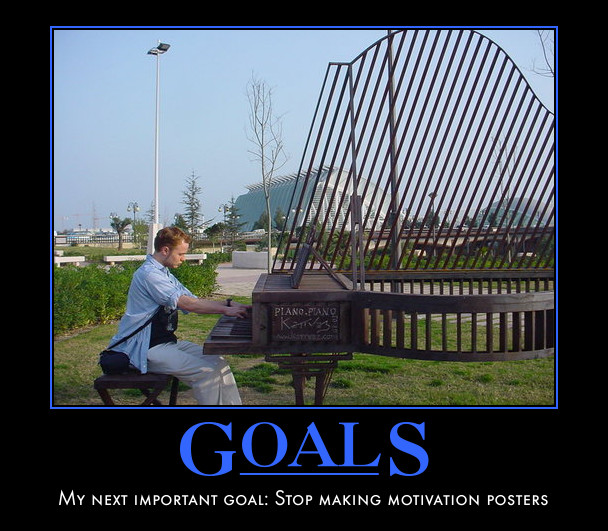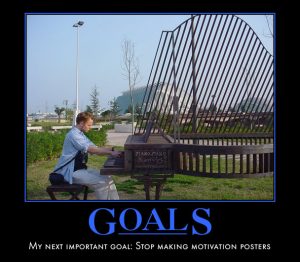Mini-goals are the path to achieving fluency
I am continuing from yesterday's post about how Redefining your Motivation can give you new things to aim for in the long-run; by going a step further and looking entirely at the short term. When we think of goals, we may think of something to work towards over a long period of time that you can reach and feel that immense sense of achievement when you do. I'm way too impatient to wait for such validation. I want to feel a sense of achievement NOW! 🙂 On top of this, a long-term goal can lead to an inefficient structure in trying to reach it.
Give yourself a time limit!
I have met so many people who have been studying a language for years and never actually made much progress, or are otherwise just about maintaining their plateau of speaking pretty well and never improving. If your goal is to speak language X fluently “some day”, then you may never even achieve that goal, very simply because “some day” does not actually exist, and will always be some blurry point in the distance.
Normally, I'm not a fan of the overly academic approaches to learning languages, but one advantage that a lot of them have is their use of examinations (what I like about the CEFR exams mentioned in yesterday's post is that you don't have to follow any particular course to do the examinations if you don't want to). Some people dread examinations and wish they weren't there, but the concept is great for motivating you to doing some work; you have a particular day and you must have learned a certain amount by that day.
Nevertheless, those that only happen at the end of the academic year have the well known situation where a lot of people don't do any work most of the year (in university for example) or take it easy and then cram in the days/weeks leading up to their exams… and yet they get the results they need! This is a classic example of work expanding to fill the time allocated to it. Think of what these same people could achieve if they had their efficient study period several times a year, or even several times a week! You don't have to be a genius, you just need the right motivation.
Now, I've “randomly” assigned myself 3 months to become fluent in Czech. Time (and this blog) will tell whether I achieve this or not, but I will definitely achieve much more than a lot of people would in 3 months, in terms of progress in the language, simply because of having invented this time limit and always having it in mind; forcing me to learn more in a shorter time. If work expands to fill the time allocated to it, then the opposite is also true! Someone commented about my “experiment” of at least having the result of me “aiming for the moon and landing on the stars”, so no matter what, I'll have achieved quite a lot after my time here if I am serious about my “overall” goal. I think I still have a good chance at achieving this goal of ‘fluency' though; you'll see what I mean in my next post. But even 3 months can be too big a time span! We need to look at the shorter term…
Smaller and specific goals all add up over time
The problem with something like the standard examination system is that it forces you to follow someone else's timetable and structure, and of course there's the fact that you may have just one exam at the end of the year instead of several throughout the year. However, when I learn a language I like to set myself a very large number of mini-goals with very short time limits. None of these goals in themselves are particularly impressive or difficult to achieve, but they all add up over time to speaking a language fluently.
Instead of just saying that you want to be fluent “some day” (or even in my case where I am picking 3 months) and hoping that it will naturally (or magically) happen, you should set yourself very specific goals in short periods of time. Below you will see a few ways you might do this; i.e. changing your long-term “unachievable” goal into smaller daily or weekly goals that you can finish completely and feel that sense of achievement immediately. All of these have worked for me at various stages in learning languages when trying to improve on my weak points:
BAD GOAL: “Eventually” have a good command of general vocabulary.
GOOD GOAL: Learn words for objects in the kitchen (for example) by 5pm and have someone test you to make sure that you remember. Then select a new theme for the next day, but come back to this one next week to make sure that you haven't forgotten what you learned.
BAD GOAL: Speak fluently some day.
GOOD GOAL: Be able to repeat learned off phrases by the end of the first day, then be able to form your own basic (grammatically incorrect) sentences at the end of the first week, and then make a new plan.
BAD GOAL: Speak with a very slight (or preferably no) accent.
GOOD GOAL: Work on rolling your ‘r' for the next 3 days like they do in the target language, getting as many tips about this one sound and mouth/tongue positioning from others as you can. Train yourself and repeat the sound as often as possible. Then ask people what other sounds distinguish your English accent and work on them one at a time.
Can you see what I'm getting at here? These goals have very tight time limits (within a few hours, or at most days) and they are definitely achievable by mere mortals who don't need to be “naturally talented with languages”. The sense of achievement is important when you are taking on such a “large” task, since it can otherwise become discouraging quickly if you focus on what you “don't” know. In fact, it's not that hard!! 🙂
“Impressive” language skills aren't really that impressive when you break them up
The main reason people think that it's so amazing to speak a language fluently is because they are looking at all of these aspects at once. Surely you'd have to be a genius to be able to learn thousands of new words, a new pronunciation system, understanding the spoken language and aaaaaaall of that grammar?! Here, it's important to see the trees from the forest, so to speak, and take things in small chunks; all of which add up together surprisingly quickly! Apart from the actual benefits and doing something practical to reach your “end” goal, there is a great sense of achievement that you can feel every day in reaching your objective. There is no achievement with “fluency” because that in itself is too vague for most people, and it's too distant to be achieved or feel any sense of achievement when it vaguely does happen (unless of course you have several longer term goals to motivate you, as I mentioned in the last post).
These mini-goals can also have a “test” at the end of the time limit (a friend seeing if you remember for example), but when you speak a language on a daily basis you don't even need this; when the situation arises where you need to say a word / apply grammar / pronounce a letter that you learned and you fail to remember it or do it correctly, that embarrassment is a strong motivator for your next study period, and you will be a lot less likely to make the same mistake again! The words that are burned most into my memory aren't so much the ones that I learned off the best way, but the ones that I learned once and then “should have” known it at the right time, but didn't. The next moment when the word I need is revealed to me is the beginning of me never forgetting it again! You have to (and will) pass through the embarrassment stage a few times before your motivation not to make a mistake when learning something new becomes intrinsic to your learning process, and your embarrassment is diminished more and more over time. This is one way that you can “naturally” become good at learning and memorising things if you weren't before. (There are other ways, that I'll be talking about later!)
Since my goal is fluency, I should point out that for many people that is a very vague concept, and that isn't very useful based on what I've discussed yesterday and today. So in my next post, I'll be examining this concept of “fluency” in more detail. When we have a better idea what we are aiming for, we can achieve it so much easier 🙂




Social